- Home
- Susanna Kearsley
Named of the Dragon Page 12
Named of the Dragon Read online
Page 12
"I thought you didn't remember what you'd read," said James. "Only how you felt about it."
"Well, yes. Unless it's poetry."
"Oh, I see," he said, and if I hadn't seen his laughing eyes I would have thought his pride was injured. ' 'So Gareth's work is poetry, while mine is—"
"Yours is wonderful. I love the way you write. But plays read differently than novels," I said, trying to explain.
Bridget, unsticking her nose from The Druid's Year, arched an eyebrow. "Jealous, darling?" she asked James.
"Of Gareth? Why on earth would I be jealous?"
I prudently extricated myself from the conversation, turning the pages of Red Dragon Rising in search of the passage I thought I remembered . .. yes, here it was. Glyn Dwr's voice. Gareth's words: The blood in my veins is the blood of Cadwaladr, last of those kings who were named of the dragon...
I read it through again, with satisfaction. I'd succeeded in sorting out every new thing that had entered my dream, now, except for the woman in blue—and I knew there was likely a simple explanation for her, as well.
Across from me, Bridget had turned soft and kittenish again, stretching out her feet to contemplate them. "James?"
"My love?"
"What are we going to do for Christmas lunch?"
He made a sound halfway between a groan and a laugh, his head dropping back for support from the cushions.' 'For God's sake, Bridget..."
"No, I mean, are we eating it here?"
"I don't know. I haven't really thought about it."
She considered the matter a moment, then said, "I think we should. Eat here, that is. It's not a proper Christmas if you don't have lunch at home."
James arched an eyebrow. "Are you going to cook it?"
"I might." She wriggled deeper in her chair, and set her chin deliberately. "My potatoes never do turn out as perfectly as Dilys's, but I make a cracking bread sauce."
Christopher, who'd given up the bookcase and had wandered to one of the tall narrow windows to view the back garden, half-turned to face Bridget. "Could you make chestnut stuffing? The real kind, I mean?"
"If I had the ingredients." She looked pointedly at James.
"All right." He stifled a yawn. "Perhaps we'll go to town tomorrow, and let you do your Christmas shopping."
"I have to buy your present, yet," she told him.
"Well, that settles it. We'll definitely go to town." He stretched, and turned to me. "You're being awfully quiet, over there."
"I'm digesting." Reluctantly, I closed the book of Gar-eth's play, and let the pages feather past my fingers. I'd been enjoying my re-reading of it, revelling again in his exquisite use of language, in the rhythm of his words. A shame the man himself was such an unappealing character. For all I would have loved a chance to represent his talent, I had no desire to deal with him that closely.
"Right," said Bridget, angling her wrist to check the time, "we've got another half an hour, then we really should get ready."
"And what," asked James, "would we be getting ready for?"
"The carol service."
"Ah."
"It starts at half past four," she said, "so I should think as long as we leave here at four-fifteen ..."
"I haven't been to church in twenty years," he interrupted, leaning his head back and closing his eyes. "It's not my thing. I never could sort out when I should sit, or stand, or whirl about. Who needs the aggravation?"
Bridget didn't look prepared to let him off the hook. "It's a carol service," she repeated, firmly. "You cannot have a proper Christmas without going to a carol service."
He kept his eyes closed, peacefully, not bothering to argue.
But his weary sigh spoke volumes.
XV
Therefore submit thy wayes unto his will,
And do by all dew meanes thy destiny fulfill
Edmund Spenser, The Faerie Queene
I found myself siding with Bridget. Not only because she was my client, and thus deserving of my loyalty, but because I rather liked the thought of sitting in a village church and listening to carols. It was Christmas, after all. I'd been so busy with my dreams and Elen's baby and my crossing swords with Gareth that I'd quite forgotten why I'd come to Angle in the first place.
My only fear was that I'd never manage to unwedge my well-fed body from the chair in time to make the service. But I did it, with some effort, and by four o'clock I'd freshened up and gone outside to wait for everybody else.
I stood by myself on the lawn for a long moment, drinking the solitude. This, I thought, not morning, was the perfect hour for church—the time when all of nature seemed to pause, to contemplate the sacred.
Above me, the whole sky had turned to gold, a pure and glowing gold that bled to crimson where the dying sun had settled on the hills. The crows, still clasping to the ledges of the tower, gazed across the marshy estuary to the village, wings at rest. The churchyard faced me, cool with trees that cast deep shadows on the leaning rows of headstones, from between whose ranks the church itself soared upwards, grey and graceful, rising up to God the way a flower reaches for the light. And between the farm and churchyard, where the estuary wandered past the tower's walls, the feathered reeds were singing, heads bowed to the breeze, like pale choristers tuning their voices for evensong.
The hinges of the front door creaked, and James came out to join me oil the lawn.
His lighter clicked; a waft of smoke brushed past my cheek. "Remind me why I'm doing this," he said.
I couldn't help but smile. He looked so like a small boy being dragged round by his family when he'd rather have stayed home, in bed. "To keep Bridget happy," I told him.
"Oh. Right." He bent his head and rubbed his neck and nodded. "A tiring business, keeping Bridget happy. She's high maintenance, you know, like a racing car—always wanting a new set of tyres, or an oil change." Lifting the cigarette to his lips, he surveyed me through the smoke. "Now you, I suspect, would be more like a Volvo."
I laughed. "Thanks a heap."
"I meant it as a compliment."
For a moment I was half-afraid that Bridget had been right about his liking me—it would have been another complication that I didn't need, this week. But nothing in his eyes displayed a more than common interest. I relaxed. "It's every woman's dream, that, to be told she's like a boring Swedish car."
"Being safe," he said, "is not the same as being boring." I had the fleeting impression he was speaking of himself, and not of me, and I studied him a moment before lifting my gaze to the weathered stone face set above the front door.
"I've been meaning to ask you what this is," I told him, and pointed. "It looks very old."
"Ah, the Gerald Stone." He tilted his head up to look at it, too. "You'll have heard of Giraldus Cambrensis, the famous Welsh chronicler?"
I had slogged through his writings in history class, years ago—Giraldus Cambrensis, or Gerald of Wales, the twelfth-century writer and monk who had served the Plantagenet kings in the turbulent times of King Richard the Lionheart. "Yes, I've heard of him."
"Well, he was born not far from here, at Manorbier. Where you went to buy the Christmas tree, actually. In his earlier clerical days he was granted the living of Angle, and this face is supposed to be his. Hence its name."
"The Gerald Stone," I repeated, looking with new eyes at the serene expression on the face, the faintly smiling features.
"No one knows who did the carving, or how old it is," said James, "but it does predate the present house."
The wind struck my upturned face, making my eyes water, and for an instant the stone features seemed to change shape, growing older, more knowing, with wise watching eyes. But when I blinked again everything looked as before.
Bridget came out through the porch door and found us like that, looking up. "What on earth are you doing?"
"I've just been showing Lyn the Gerald Stone," said James.
"How thrilling." Fastening the collar of her coat, she looked round. "Are w
e ready? Where's your brother?"
"He went next door, to see if Elen wants to come."
"Oh, marvellous."
"Where's your Christmas spirit, darling?" His slanting glance held dry amusement. "Peace and goodwill to all men, and all that."
Bridget smiled at him, sweetly. "I've no problem with showing goodwill to all men ..."
"Brat," he called her, lightly. Turning, he stripped off his gloves and handed them to me. "Here, hold these for a minute, wiH you, Lyn? I can't feel a thing with them on, and I need to make sure that I've got enough coins for the offertory."
Bridget frowned. "Well, I do hope Elen doesn't come."
"It looks as though you have your wish," James answered, bringing our attention to the fact that Christopher had just come round the far side of the East House, on his own.
"She wasn't there," he told us, as he came across the lawn.
"Oh, too bad," said Bridget. "Shall we go, then?"
"By all means." James pitched his cigarette away and, having reassured himself as to the contents of his wallet, tucked it away and reclaimed his gloves. "I can hardly wait."
"Is that meant to be sarcastic?" she asked.
"Not at all. There's nothing I love more than sitting freezing in a church while everyone around me sings off-key."
Christopher grinned. "That's nostalgia, for you, surely." To the rest of us, he said, "James was a choirboy once, you know."
His brother shot him a dangerous glance. "I knew I should have drowned you in the bath when Mother brought you home from hospital."
"You very nearly did, as I recall."
"Yes, well, I should have held you under longer."
"Now James," said Bridget, teasing, "you're forgetting what you told me. Peace and goodwill."
"Bloody rubbish." But his mouth curved as he said it, and he fell obediently into step beside me as Bridget led us past the tower, through the gate, to where the lane began. From there we took the shortcut, down across the strip of pasture to the playground fence where, one by one, we filed through the kissing gate. Two boys were playing football round the posts that held the swings, but they barely raised their heads as we went by. On the far side of the playground, under the shade trees, a green metal gate opened out to the street.
It seemed a quicker way to reach the village, really, and I marked it down to memory, as it meant I wouldn't have to walk past Gareth's garden. His cottage lay now to my right, behind a long stone wall half-buried in bright sprays of red cotoneaster. Ignoring it, I turned the other way, towards the church.
I'd always found a village church more holy than a great cathedral. I'd been married in a church like this one, near my parents' home in Kent, and when my son had died I'd had him buried there, beneath the guardian yew, with all my ancestors around him so he wouldn't be alone.
This churchyard had a yew, as well—an ancient, twisted tree that spread its darkly tangled arms above the headstones, giving shelter and protection to the silent, sleeping dead. Here and there the ivy trailed across the older graves, and faded flowers languished in the grass. The peace was tangible. I breathed it in, and sighed, and Bridget, walking at my shoulder, turned to James.
"I ought to warn you, darling, Lyn does have a weakness for places of worship. I learned that, when we went to Paris. I think we saw every cathedral and church in the city."
"It was probably good for you," James remarked.
His brother turned. "This from a man who hasn't been to church in years."
"I'm going now."
"We can only hope that God survives the shock."
But James passed through the porch without incident. Except for the smiling young woman who handed us carol sheets, nobody seemed to take notice, and I saw no sign that God had noticed, either, let alone expired. The saints in the arched stained-glass windows went on staring serenely across at each other, bathed in coloured light that slanted bravely through the shadows of the nave. And even the handful of people already seated in the pews seemed more intrigued by Bridget than by James.
It was a lovely little church, filled with the rich Sunday scents of oiled wood and old stone, with rough whitewashed walls and a ribbing of dark beams supporting the arched ceiling high overhead. A few memorial tablets commemorated members of the same family—the ancestors, I guessed, of James's friends from the Hall.
"That's right," said James, when I asked. "A pity they're not here today, I'd introduce you. They said something about going up to London for a few days, but they should be back by Christmas."
Even absent, they were very much in evidence. The stained-glass window set above the pew we chose to sit in had been given in the memory of another of their name. I only glanced at the dedication as I genuflected to the altar and slid into the pew beside Christopher, kneeling out of habit for a moment's silent prayer.
When I lifted my head from my intertwined hands, my gaze unexpectedly locked with a dark and familiar one— Gareth had turned in his seat near the front of the church, one shoulder pressed to the coarse whitewashed wall, to watch my display of devotion. He was too far away for me to read his eyes; I couldn't tell what he was thinking.
Elen, sitting close beside him, bouncing Stevie on her lap, looked round as well, and smiled, and waved. James raised one hand in answer, shifting sideways on the pew until his thigh touched mine, as Bridget squeezed in on the aisle end.
"Well, there you are," said James, to Christopher. "You needn't worry about Elen, Chris. She's with her knight protector."
I wasn't altogether sure how serious Christopher's pursuit of Elen was, but if he felt any jealousy now, he hid it well. He merely looked, and nodded, and leaned back against the wooden pew, turning his attention to the carol sheet. Bridget was more vocal.
"And look, she's brought her son as well. I swear I'll never know what makes some mothers bring their babies into church."
James smiled. "Ordinarily," he said, "I would agree with you. But seeing as it's Christmas, I should think that barring babies from the church would be impolitic. If nothing else, it would completely spoil the crib."
Bridget grudgingly agreed. Twisting in her seat, she looked round with new interest. "Is there a crib in here, I wonder?"
There was one indeed, artistically arranged at the rear of the church, where the bell rope hung down placidly beneath the tower.
"How pretty," she said. "Mind you, that sheep on the left looks a little the worse for wear, poor thing. And Baby Jesus looks as though he's had some sort of fit..." She caught herself too late, and flashed a guilty glance at me, the way a child does who's spoken out of turn. "Oh, Lyn, I'm sorry. I should learn to keep my mouth shut."
"It's all right."
James, excluded from the brief exchange, looked from my face to Bridget's. "What's that?"
I could sense Bridget kicking herself as she answered him. "Nothing. It's nothing."
"Well, it's obviously something, if you—"
"Trust me, James, just leave it."
"Fine." Following his brother's example, he shook out his carol sheet and settled back to study it, while Bridget sent me one more sideways look, to satisfy herself I wasn't lying.
But I had told the truth—I really felt all right. It might have been because we were in church, a place that always seemed quite separate from the world outside its walls; a place where evil, pain and sorrow couldn't enter. Here the peace, well guarded by the golden eagle perching on the lectern, flowed round and through and over me like water, and my thoughts and feelings disengaged themselves, like weary swimmers letting go the shore to float, eyes closed, upon the current. Here I could think of Justin, without pain.
That pain had happened to another woman, in another place than this.
I knew, of course, the feeling wouldn't last. The church might give me temporary solace, but it wasn't real. Eventually, I'd have to leave and carry on with living. But for now, it did feel wonderful to stand and join in singing all those old remembered carols that seemed lovelier, some
how, because I only heard them once a year. The cold of the church numbed my nose and pricked my fingers full of needles, and when the congregation sang the bursts of misty breath showed everywhere against the dimness, curling up towards the rafters like the incense from a censer, while a small but able children's choir led us through the melodies, their faces made angelic by the pulpit's candlelight.
For the first time since I'd come to Wales, it truly felt like Christmas.
It was a joyful feeling, that expanded in my chest and left no room for self-restraint. Which might explain why, when the carol service ended and we started shuffling out into the aisle, and above the sudden crush of heads my gaze locked for a second time with Gareth's, I impishly lifted my chin a notch higher and sent him my most brilliant smile. Smiling at the devil was the best way to defeat him, so my father'd always said.
I'm not sure mine defeated Gareth, but it did surprise him. I saw his eyebrows lifting in the instant before someone stepped in front of me and blotted out my view.
"Well, well," James murmured. "Look who's here."
Elen didn't hear him. Shifting Stevie higher on her shoulder, she faced me with that same bright-eyed and happy look I'd seen that afternoon, a look laced through with secret knowledge.
"Hello," she said, turning in the aisle so that her back was to the window arched above the narrow pew where we'd been sitting. I hadn't really studied the window earlier, only the memorial dedication along its bottom edge, but now I saw it showed, appropriately enough, the Nativity. I looked at Elen, standing like a modern incarnation of the stained-glass Madonna behind her, and I smiled. "Hello."
"Stevie wanted to see you."
I rather doubted that. He was asleep, for one thing, with his hand curled in a fist around a waving lock of Elen's hair. But I was reckless still with Christmas spirit, and on impulse I indulged her. "That's very nice of him," I said, and bravely touched one finger to his hand. "Hello there, Stevie."
I'd meant it as a glancing touch, a tiny stroke, and nothing more. But Stevie's small hand spread, and reached, and curled again, and held my finger fast. A flash of warmth, like an electric shock, shot upwards to my shoulder as my gaze fell for the first time on the words set in the stained-glass window, underneath the blue-robed Virgin and her glowing infant: Unto us a child is born. Unto us a son is given.

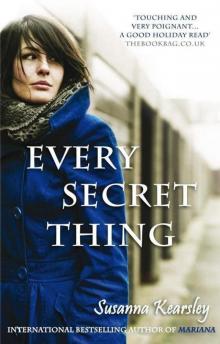 Every Secret Thing
Every Secret Thing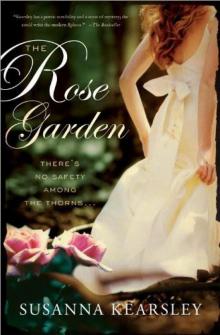 The Rose Garden
The Rose Garden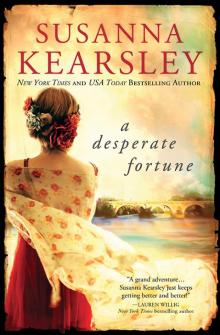 A Desperate Fortune
A Desperate Fortune The Winter Sea
The Winter Sea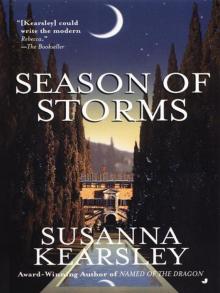 Season of Storms
Season of Storms Mariana
Mariana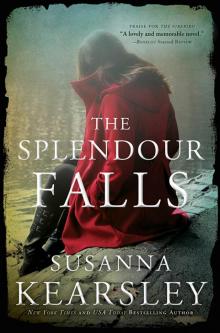 The Splendour Falls
The Splendour Falls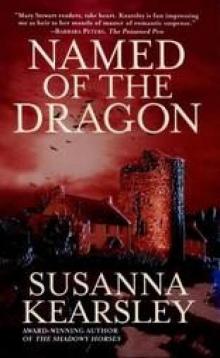 Named of the Dragon
Named of the Dragon Sophia's Secret
Sophia's Secret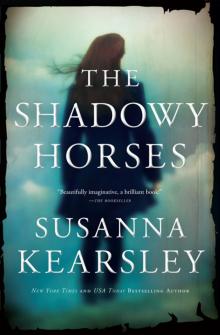 The Shadowy Horses
The Shadowy Horses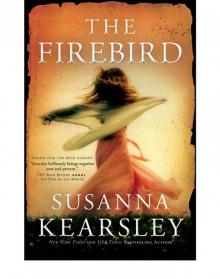 The Firebird
The Firebird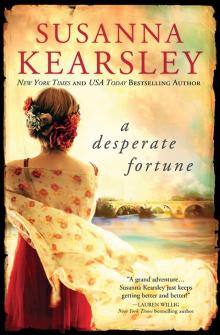 Desperate Fortune
Desperate Fortune